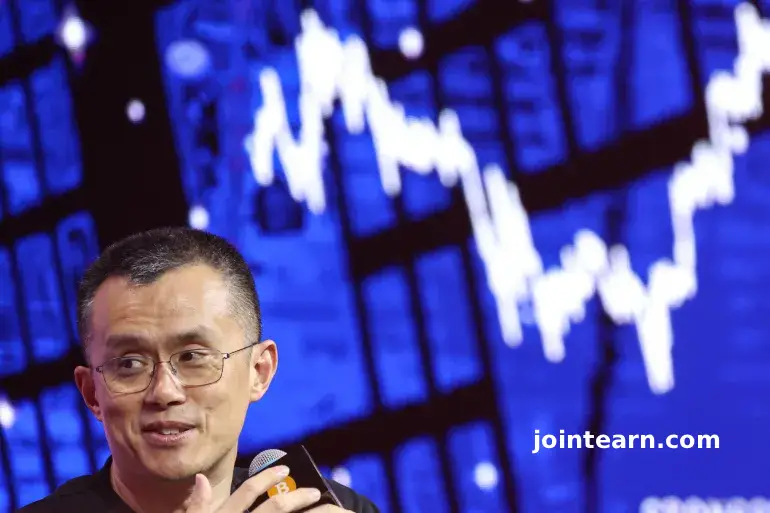
Washington, D.C., October 23, 2025 — In a headline-making move that underscores his growing alliance with the cryptocurrency industry, U.S. President Donald Trump has officially pardoned Changpeng Zhao (CZ), the founder and former CEO of Binance, the world’s largest cryptocurrency exchange. The decision comes less than two years after Zhao’s conviction for violating U.S. money-laundering laws, marking one of the most controversial presidential pardons of Trump’s second term.
Trump Pardons Binance CEO Changpeng Zhao
White House Press Secretary Karoline Leavitt confirmed the pardon in a Thursday statement, saying President Trump “exercised his constitutional authority by issuing a pardon for Mr. Zhao, who was prosecuted by the Biden Administration in their war on cryptocurrency.”
The statement framed the move as part of Trump’s broader campaign to “restore fairness and innovation” in the financial technology sector — a stance that has gained him significant support from crypto executives and digital asset investors.
Zhao Expresses Gratitude and Promises a Crypto Renaissance
Responding on social media platform X (formerly Twitter), Zhao wrote:
“Deeply grateful for today’s pardon and to President Trump for upholding America’s commitment to fairness, innovation, and justice. We’ll do everything we can to help make America the Capital of Crypto.”
Zhao, a Canadian citizen born in China, is among the most prominent figures in the global crypto industry. He resigned as Binance’s CEO in 2023 after the company admitted to failing to maintain adequate anti-money laundering safeguards — a violation that resulted in a $4.3 billion fine from U.S. regulators.
In 2024, Zhao was sentenced to four months in prison for violating the Bank Secrecy Act, making him the first person to serve time for such violations. The landmark case highlighted the U.S. government’s increasing scrutiny of cryptocurrency firms accused of facilitating illicit financial activity.
Trump’s Growing Ties to the Crypto Industry
Zhao’s pardon is the latest in a string of clemency decisions by Trump benefiting high-profile tech and financial executives. Earlier this year, Trump pardoned the three co-founders of BitMEX, another major crypto exchange, who had been convicted of failing to implement anti-money laundering measures.
He also granted clemency to Ross Ulbricht, the creator of the notorious online marketplace Silk Road, and Trevor Milton, founder of electric truck company Nikola, who was convicted of securities fraud.
These pardons have solidified Trump’s reputation as a “crypto-friendly” president, sharply contrasting the Biden administration’s enforcement-heavy approach toward blockchain and digital finance companies. During his 2024 re-election campaign, Trump vowed to “end the war on crypto” and position the United States as a global leader in blockchain innovation.
Binance’s Legal Troubles and Future Prospects
Founded in 2017, Binance quickly grew into a dominant global trading platform for cryptocurrencies like Bitcoin, Ethereum, and BNB. However, its meteoric rise was shadowed by allegations of lax compliance, unregistered securities offerings, and facilitation of money laundering.
Zhao’s legal troubles began under the Biden Department of Justice, which accused Binance of processing billions in illegal transactions and allowing users to evade sanctions and KYC (Know Your Customer) protocols.
While Zhao’s conviction temporarily removed him from leadership, the presidential pardon could pave the way for his return to the crypto industry. Insiders suggest that Binance may soon reopen its U.S. operations, which were previously curtailed amid regulatory uncertainty.
Crypto market analysts say Trump’s decision signals a potential policy shift toward greater acceptance of digital currencies under his administration. Following the pardon announcement, Bitcoin surged 4.2%, and Binance’s native token BNB rose more than 8% in early trading.
Critics Warn of Political and Ethical Implications
Critics, however, have warned that Trump’s pardon could embolden crypto companies accused of misconduct. Financial watchdog groups argued that absolving Zhao — who oversaw one of the largest corporate fines in U.S. history — sends a dangerous message about accountability in the tech sector.
“Presidential pardons are supposed to serve justice, not protect billionaires,” said one former Treasury official. “This decision undermines years of progress in anti-money laundering enforcement.”
Still, Trump’s allies claim the pardon demonstrates his commitment to “economic freedom” and innovation-first policies, positioning the U.S. as a haven for blockchain entrepreneurs.
A Political Statement as Much as a Legal One
Trump’s pardon of Changpeng Zhao aligns with his administration’s broader efforts to court Silicon Valley and Wall Street leaders disillusioned with regulatory crackdowns. It also reinforces the president’s image as a populist defender of free enterprise, especially as the global crypto market rebounds after years of volatility.
Zhao’s reinstatement could have far-reaching consequences for the industry — potentially accelerating both institutional investment and government oversight in the digital asset economy.
As Zhao wrote in his post-pardon message:
“Crypto is here to stay — and now, so am I.”


Leave a Reply